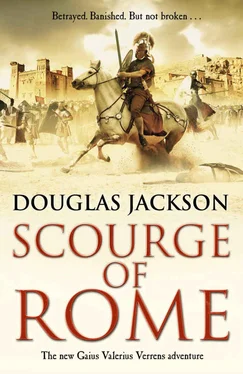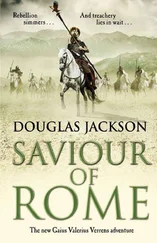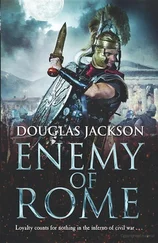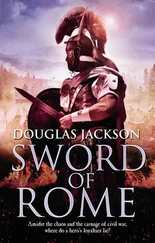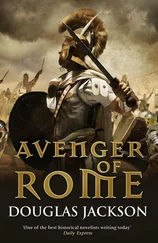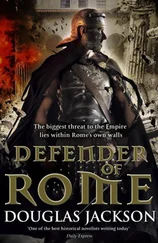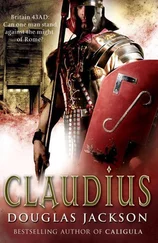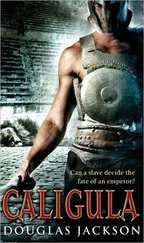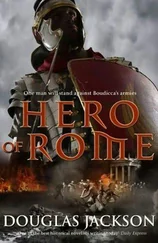Douglas Jackson - Scourge of Rome
Здесь есть возможность читать онлайн «Douglas Jackson - Scourge of Rome» весь текст электронной книги совершенно бесплатно (целиком полную версию без сокращений). В некоторых случаях можно слушать аудио, скачать через торрент в формате fb2 и присутствует краткое содержание. Год выпуска: 2015, ISBN: 2015, Издательство: Transworld Digital, Жанр: Исторические приключения, на английском языке. Описание произведения, (предисловие) а так же отзывы посетителей доступны на портале библиотеки ЛибКат.
- Название:Scourge of Rome
- Автор:
- Издательство:Transworld Digital
- Жанр:
- Год:2015
- ISBN:9780593070598
- Рейтинг книги:5 / 5. Голосов: 1
-
Избранное:Добавить в избранное
- Отзывы:
-
Ваша оценка:
- 100
- 1
- 2
- 3
- 4
- 5
Scourge of Rome: краткое содержание, описание и аннотация
Предлагаем к чтению аннотацию, описание, краткое содержание или предисловие (зависит от того, что написал сам автор книги «Scourge of Rome»). Если вы не нашли необходимую информацию о книге — напишите в комментариях, мы постараемся отыскать её.
Scourge of Rome — читать онлайн бесплатно полную книгу (весь текст) целиком
Ниже представлен текст книги, разбитый по страницам. Система сохранения места последней прочитанной страницы, позволяет с удобством читать онлайн бесплатно книгу «Scourge of Rome», без необходимости каждый раз заново искать на чём Вы остановились. Поставьте закладку, и сможете в любой момент перейти на страницу, на которой закончили чтение.
Интервал:
Закладка:
‘But you lived.’
‘I lived.’
‘Rome defeated by a woman,’ Ariston repeated as if he didn’t quite believe the words he was saying.
‘She won every battle but the last.’ Valerius’s voice sounded so bleak that Ariston reined in his horse to study him.
‘What happened then?’
Valerius met his gaze. ‘Let us hope Titus is more merciful to the Judaeans than Rome was to Boudicca and her Britons.’
As they rode, Ariston explained that the old caravan road would eventually lead them to Darkush, famous for its healing waters, where they could replenish their supplies. After that they would cross the spine of the mountains into the next valley, far from any pursuit. ‘The valleys eventually meet again about twenty miles south, but it’s well populated country and we have a choice of roads to take. I doubt anyone will pay attention to us.’
Over the next three days Valerius gained a better appreciation of his Syrian companion. For a start, Ariston possessed an instinct for danger rivalling his own. In Darkush he bought Valerius a hooded cloak as voluminous as the one he wore himself. It provided the twin attributes of perfect anonymity and, despite being light and airy, giving as much protection from the cold as a much heavier garment.
When Valerius quizzed him about his own history he looked troubled. ‘A man like me has many lives. One for every town he visits and woman he lies with. My father owned a tract of good land north of Palmyra, but a neighbour coveted the sweet water that had been ours by right for five generations. When my father was found dead in his fields I sought out the neighbour and demanded compensation. He pulled out a knife …’ Ariston shrugged; it could have happened to anyone. ‘He had powerful friends, so I had to run or die. The Bedou took me in and I stayed with them for a while, but the desert is not for me. I found a position as a caravan guard and travelled deep into Persia and as far as the Indus. In Gandhara I took a wife, but she died along with our child.’
‘Did you ever go back?’
‘Only once. My mother was dead and my brothers worked the farm. I think they would have driven me off, but I only stayed an hour. After a few years in the saddle farming was not for me. A long road and a different bed every night are my life, and I am satisfied.’
‘A different woman, too, I would wager?’ Valerius attempted to lighten the mood. The Syrian’s words stirred an unfamiliar emotion. For the first time since he’d left Rome he felt free of responsibility. Thanks to Domitia Longina Corbulo’s intervention his sister Olivia had been allowed to keep the family estate at Fidenae. Olivia had brought her newborn son to visit him on the day he’d left the city. She knew she could never formally marry Lupergos, the child’s sire and her estate manager, and the boy had been named for Valerius’s father, Lucius. He felt a rush of contentment at the memory. Perhaps it was the vibrant colour of the mountains that changed with every bend in the road and arc of the sun, or the sweet water and even sweeter air, but it felt as though he were on the cusp of a new existence. He knew it was dangerous to tempt the gods, but maybe, just maybe, he’d outridden the clutching fingers of the past.
That night they bedded down in a gully away from the road. Ariston estimated that they’d reach Apamea at noon the next day and boasted of the luxuries that would be available to them in the city’s markets.
An hour later they heard the screams.
IV
Valerius reacted instantly. Even as he leapt from the blankets with gladius in hand his mind was calculating the direction of the agonized cry. One thing was certain, it had come from a woman, and one in terrible pain.
He dashed up the gully wall with the branches of scrub oak and cypress tearing at him, praying she’d cry out again so he could fix her position. Sharp stones cut into his bare feet, but that didn’t concern him so much as the noise he was making and the fact that he had no idea what was beyond the brow of the hill.
His brain only gradually came to terms with the fact that he was acting alone, with no Serpentius at his side. Reluctantly, he forced himself to slow. He would do the woman no good by getting himself killed. The best he could hope for from Ariston was that the Syrian looked after the horses and didn’t simply disappear into the night with them.
Another scream. Much closer now, long and drawn out, and he angled to his left towards the source. The word childbirth entered his mind – he’d look a fool if he burst in with a sword as the baby emerged – but he quickly dismissed it. He’d heard enough women give birth in the baggage camps that followed a legion to know this was a different kind of pain. A pain accentuated by terror.
He reached the lip of the rise and crouched among the bushes, staring into the darkness across the broken ground ahead. Perhaps a hundred paces away he detected a faint glow just visible through the stunted trees among the dips and the hollows. On the point of rising he froze, paralysed not by any hint of danger but by a sudden, unexpected and uncalled-for sense of self-preservation. His brain told him he didn’t have to do this. He had no obligation to whoever was out there being hurt. How many times had honour and duty driven him to risk his life, and for what? In Rome he’d been moments from a slow and agonizing death. In Armenia, Gnaeus Domitius Corbulo had sentenced him to be beaten with pickaxe handles. He’d lost his right hand in Britannia. He could turn back now and no one would ever know. No one but Gaius Valerius Verrens.
But Valerius had been fed a diet of honour and duty since he’d first suckled his mother’s teat. His father had beaten it into him with a vine stick and with every blow had suffered more anguish than his victim. Corbulo, whom he’d loved as a father, had gone to his death because he believed that an honourable man did not have the luxury of choice, only duty. How could he be any less of a man? Gritting his teeth, he forced himself to his feet and slithered down the far side of the slope, leaving an almost invisible trace of dust in the darkness.
As he moved swiftly across the broken ground the soldier’s questions ran through his mind. How many? More important, how many of them would be willing to die? It was a fact of war that for every ten men you faced with a sword six would rather be somewhere else entirely, and two would run at the first sign of danger.
And their dispositions? Would they have posted a guard? That depended on whether they were soldiers or brigands. He could hear the sound of mocking laughter now, and in the background a woman pleading for an unlikely mercy. He touched the little wheel of Fortuna and prayed that any guard would be distracted by the sport. These were clearly men intent on their work. Men who enjoyed inflicting pain.
By now he could see the bright flicker of a fire through the trees and he padded softly towards the source. Despite the urgency, he took his time, allowing his eyes to adjust to the changing light and testing the air for danger with every step. Gradually moving shadows appeared, crouched low over something that glowed pale gold in the light of the flames, their hands busy and their minds intent on their victim. Four at least, perhaps five. He calculated the odds and was undismayed. Civilians, or at least dressed in civilian clothing. In an ordered world that should mean the sight of a naked blade would give them pause. If Valerius had his way that pause would kill them.
Three of the men held down their near-naked captive while a fourth gripped her wrist and intermittently forced her hand into the flames, accounting for the screams he’d heard. The final torturer was a huge man with features hidden behind a striped scarf wound around his head in such a way as to leave only the eyes showing. His role seemed to be limited to questioning the tormented woman.
Читать дальшеИнтервал:
Закладка:
Похожие книги на «Scourge of Rome»
Представляем Вашему вниманию похожие книги на «Scourge of Rome» списком для выбора. Мы отобрали схожую по названию и смыслу литературу в надежде предоставить читателям больше вариантов отыскать новые, интересные, ещё непрочитанные произведения.
Обсуждение, отзывы о книге «Scourge of Rome» и просто собственные мнения читателей. Оставьте ваши комментарии, напишите, что Вы думаете о произведении, его смысле или главных героях. Укажите что конкретно понравилось, а что нет, и почему Вы так считаете.
